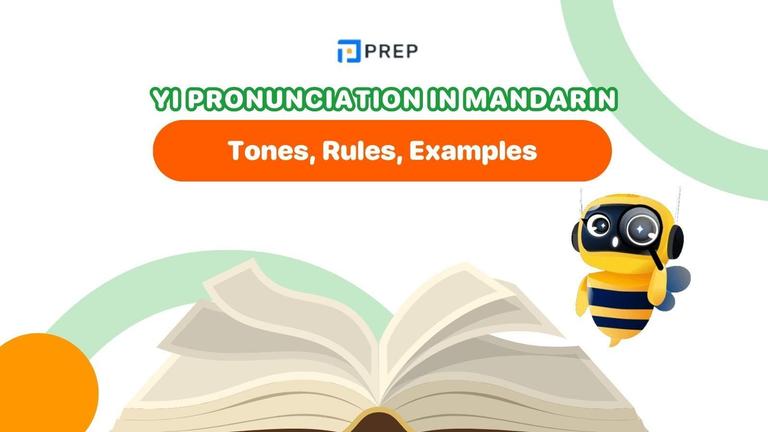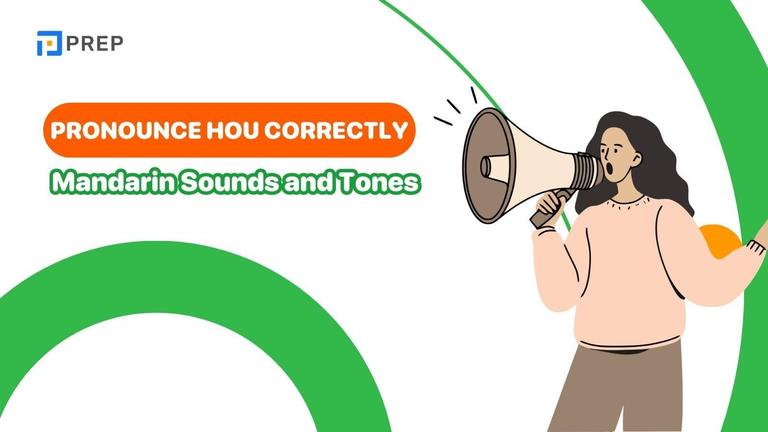Sample Speaking Part 2, 3: Describe an important plant in your country
The IELTS Speaking prompt "Describe an important plant in your country" is quite manageable for candidates, especially considering Vietnam's rich agricultural heritage. So, there's no need to fear this topic! However, delivering a coherent and comprehensive response can be challenging. Therefore, below are an outline, a sample response, and detailed vocabulary related to the topic, explained by the teachers at PREP. Let's review the sample response "Describe an important plant in your country" right away!

I. IELTS Speaking Part 2 question and answer: Describe an important plant in your country
1. Cue card: Describe an important plant in your country
Describe an important plant in your country. You should say:
-
What it is
-
What it looks like
-
Where and how it is grown/ Where it is found
-
Why you like or dislike it
And explain why it is important.

2. Outline: Part 2
2.1. Sample idea
-
The prompt "Describe an important plant in your country" requires test-takers to describe an important plant in their country, providing the following information:
-
What is the name of the plant?
-
What is the appearance of the plant?
-
Where is the plant grown?
-
Do you like or dislike this plant?
-
Explain why you think this plant is important.
-
-
This prompt does not directly belong to any specific topic.
-
However, the easiest and most effective way to handle the "Describe an important plant in your country" prompt is to closely follow the cues provided in the prompt and provide the clearest information possible, avoiding overly general statements.
-
Additionally, you can also approach it in the form of an "Event" essay - recount a story of traveling and then encountering information about this plant, then expand on it further. This approach can help diversify the tenses used, but may not be as secure if your language proficiency is not strong enough.
-
-
For the first question in the "Describe an important plant in your country" prompt, "What is the name of the plant?"
-
This is generally quite easy to answer, as Vietnam is an agricultural country.
-
However, besides choosing traditional and culturally significant plants, you can also select plants that are more familiar to the youth and the products we directly use - such as cacao or coffee, to answer the "Describe an important plant in your country" prompt.
-
-
Next, we need to go into more detail with questions 2 and 3, the appearance of the plant and where it is grown.
-
In this question in the "Describe an important plant in your country" prompt, in addition to sharing the basic information you have, test-takers can also elaborate on when you first learned about this plant.
-
In the process of sharing your idea, try to incorporate past tenses and sequencing devices from the "Events" essay type to conquer the "Describe an important plant in your country" prompt.
-
-
Continuing this line of thinking, you can answer the 4th and 5th questions in the prompt - whether you like or dislike this plant and explain why you think this plant is important.
-
In this point, we can share more and have contrasts or continuity between the past and present in your preferences and understanding. Spend more time on this question, as it is the main content of the "Describe an important plant in your country" prompt.
-
To answer clearly, coherently, and on-target, you should present your arguments clearly and may choose to incorporate a list of the benefits this plant brings to you and the national economy. Don't forget to convey your emotions through your tone of voice when answering the "Describe an important plant in your country" prompt.
-
2.2. One-minute note-taking
|
What it is |
Cacao tree - Chocolate |
|
What it looks like |
Previously thought the tree - small But could reach 12 meters in height |
|
Where and how it is grown/Where it is found |
Dak Lak |
|
Why you like or dislike it And explain why it is important |
Love chocolate Ability to grow cocoa trees → advanced economic potential and contribute to the global market → reduce foreign assistance. |
3. IELTS Speaking Task 2 samples: Describe an important plant in your country

Let’s take a look at IELTS Part 2 Speaking examples on Describe an important plant in your country. Review the sample below to practice for the IELTS Speaking test at home effectively, Preppies!
When talking about a major plant in Vietnam, I believe the first thing that springs to people‘s mind mostly would be the paddy rice plant, or the cherry blossoms. But for me it would be an underrated tree, the cocoa plant, on account of how much it contributes to our country and also, to our great happiness in life. I mean, among all the products that we have the chance to enjoy, chocolate is unanimously loved. And it is nowhere but our Vietnam to be the birthplace of the best chocolate on earth.
Had it not been for my visit to Marou Farm in Dak Lak last summer, I would still be clueless about neither its appearance nor its contribution to our economy. It was such a once-in-a-lifetime experience as I now know how chocolate is made, from beans to bars.
Back then I had known the chocolate came from beans, which I could deduce that the tree must have been small, as you know, beans could never be that big. When I took my first step onto the farm, it blew my mind to realize the little cocoa tree actually could reach a height of up to 12 meters, making me just a tiny human standing in a farm full of large cacao trees. I could go on this for hours but I guess we all should go there and see for ourselves.
It is difficult to say whether I like this plant or not, but definitely it would not take more than a second for me to say I love chocolate and everything comes with it, and I bet the case is also true for others. As now Dak Lak farmers are capable of growing qualified cocoa trees sustainably, this has advanced their economic potential and ability to contribute to the global market, therefore reducing the need for foreign assistance.
That’s how this plant does wonders for our macroeconomy on a whole. And for me, I am grateful for the best chocolate to enjoy!
Below is some useful vocabulary that has been used in the sample response to describe an important plant in your country:
-
springs to people's mind: something that immediately comes to mind
-
Underrated (adj): undervalued, not appreciated enough
-
Unanimous (adj): in complete agreement
-
Had it not been for: a third conditional phrase, if it were not for something in the past
-
Clueless (adj): completely unaware, without any knowledge
-
Once-in-a-lifetime: an exceptional, amazing experience that happens rarely
-
blow sb's mind: to impress, excite or shock someone greatly
-
reach a height of: be able to grow to a certain height
-
see for ourselves: to observe or experience something directly
-
capable of (adj): having the ability or skills to do something
-
Sustainably(adv): in a sustainable manner
-
Advance (v): to progress, develop
-
economic potential: the potential for economic growth
-
global market: the worldwide market
-
foreign assistance: support or aid from other countries
Note: You can use the sample above to answer questions like: Describe an animal or plant that is important in your country, Describe a plant that is important in your country, Describe a plant grown in your country, Describe a person you know who loves to grow plants, etc.
II. Sample IELTS Speaking Part 3: Plants
“Plants” is a topic related to the IELTS Speaking Part 2 task "Describe an important plant in your country". How would you handle this topic if it comes up in the Speaking Part 3 section? Check out the sample answers from the teachers at prepedu.com below!
1. What plants are important to the economy in your country?
I think that besides rice, coffee is also a tree worth mentioning because of its great significance that drives Vietnam’s growth. That said, being the world’s largest producer of robusta beans, coffee has become the top export industry that helps boost our economy.
From what I have read, coffee export revenue is even predicted to increase at an accelerating rate in the foreseeable future as nowadays Vietnamese farmers are capable of growing and even processing high-quality beans, sustainably. Can’t wait to see our labels at every corner of the world!
-
great significance: great importance
-
Drive (v): to motivate, to spur on
-
Export industry: export industry
-
Boost our economy: to drive the growth of our economy
-
Export revenue: export revenue
-
Accelerating rate: rapid growth rate
-
Foreseeable future: the near future
2. Is it common for people to have gardens in your country?
Although these days concrete jungles have become more common than ever, I would still say yes, as gardens not only lend a visual interest to the overall house, but it also serves as a therapeutic hobby for the owner themselves. I tend to think Vietnamese always want to make their house the most attractive possible, be it for an apartment on floor 20 or a tube house in a crowded street, and that’s when a cozy space filled with greenery would do.
Apart from the decorative purpose, I also believe that Vietnamese have gardens just out of fun, especially when the act of gardening itself has already been a form of modern meditation, helping us to lock ourselves away from the world for a while.
-
concrete jungles: urban areas dominated by concrete buildings and structures
-
end a visual interest: create a visual point of interest
-
a therapeutic hobby: a hobby that has a therapeutic or healing effect
-
Greenery: vegetation, plants
-
out of sth: because of something
-
Meditation: the practice of mental concentration and focus
-
lock ourselves away: isolate or shut ourselves off from something
3. How can people be encouraged to grow their own food?
As city dwellers are becoming more dependent on supermarkets, persuading them to switch to producing their own food is difficult, but not impossible. Ro encourage these people to engage their green thumb and plant crops around their homes, I think there should be some incentives at first, you know, some extrinsic motivation to start with.
It would be great if the local authorities can organize some harvesting contests, maybe by giving each home a bag of tomato seedlings and see which family can grow the most out of it. Step by step, I believe this does not only stimulate competitiveness among the adults (which is a nature of urban citizens), but it also piques the kid’s curiosity. Once these people understand and get accustomed to having available fruit and veggies at the back of their house, they may say goodbye to convenience stores.
-
green thumb: a natural talent or ability for growing plants successfully
-
Incentive (n): financial motivation or encouragement
-
extrinsic motivation: motivational factors that come from outside the individual
-
Seedling (n): a young plant that has just sprouted
-
stimulate (v): to arouse or excite
-
Competitiveness (n): the desire to win or be better than others
-
Pique sb's curiosity: to arouse or stimulate someone's curiosity
-
get accustomed to: to become used to something
4. Why do people grow plants?
There are many reasons why people do such things, but I think the most important one lies in the reward it offers to some people, not physically, but mentally. I suppose that because plants are quite calming in a way that we can feel relaxed just by looking at their tranquil green shades. It’s fair to say that growing plants can be a mood booster, especially when the flowers start to bloom.
For other people, I think they solely grow plants for food, you know, what’s better to stock up your fridge with than your home grown veggies at home? What I mean is, there are people who care enough about their health to produce their own food, getting rid of all additives and harmful chemical substances, and that is definitely a promising picture for generations to come.
-
Lie in: to be included in or belong to
-
Mood booster: something that lifts one's mood or improves mental state
-
Stock up: to accumulate a supply of something
-
home grown veggies: vegetables grown at home
-
Additives: substances added to food or other products
-
Chemical substances: chemical compounds or materials
III. Conclusion
This article has provided a sample IELTS Speaking Part 2, 3 response on the topic of "Describe an important plant in your country", written by the teachers at PREP. Check out the sample response to effectively study IELTS at home and achieve a high Speaking band score!

Hi I'm Chloe, and I am currently serving as an Product Content Administrator at Prep Education. With over five years of experience in independent online IELTS study and exam preparation, I am confident in my ability to support learners in achieving their highest possible scores.
Comment
Premium content
View allPersonalized roadmap
Most read












